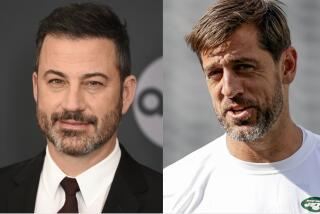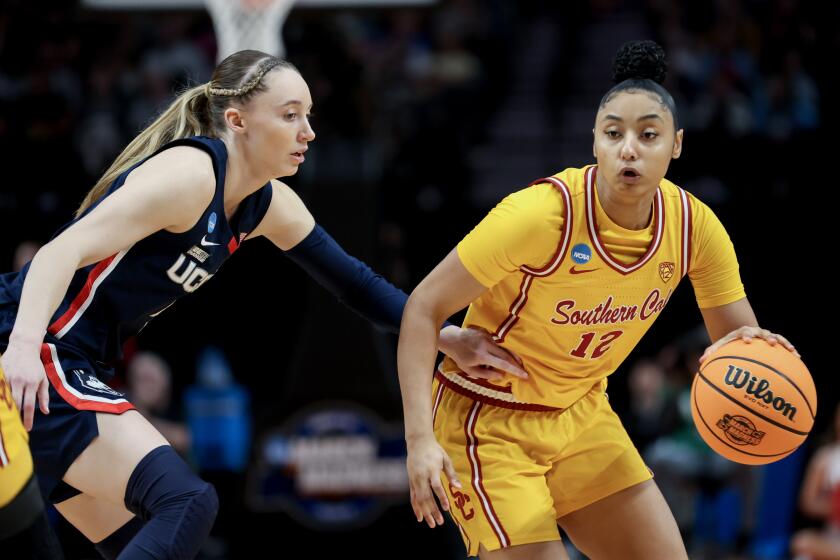NFL Says It Knew of Drug Problem on Patriots
The Monday announcement by the New England Patriots that at least five of their players had serious drug problems did not come as a surprise to the National Football League.
“We were aware of it (the Patriots’ problem) for some time,” Don Weiss, the league’s executive director, said in a phone interview Wednesday.
Despite that knowledge, however, and despite the financial magnitude and national impact of the Super Bowl, the league apparently felt no obligation to inform the public of the Patriots’ problems or to have the Patriots go public.
It was not until two days after New England had lost to the Chicago Bears, 46-10, in Sunday’s Super Bowl at New Orleans that Coach Raymond Berry, in a copyrighted story in the Boston Globe, revealed the problem and said that the Patriot players had met Monday morning in New Orleans and approved a voluntary testing program that the National Football League Players Assn. has since said is in violation of the collective bargaining agreement.
The union has said that it will file a grievance with the National Labor Relations Board.
Weiss seemed hesitant to discuss the league’s reaction to the Patriots’ announcement and would not offer a definitive response when asked if the league, aware of the Patriots’ problems and historically concerned about its credibility and public perception, didn’t have an obligation to reveal the situation, particularly when the Patriots clinched a Super Bowl berth.
“I don’t want to comment overall,” Weiss said. “We have been talking to the Patriots, trying to work out the situation. They’re doing what they feel is right. Obviously, there are a number of different things involved.”
Asked if the Patriot announcement in the wake of the Super Bowl didn’t embarrass the league, Weiss paused, then said: “I don’t think it did. Raymond Berry felt that on the basis of what he knew, he had to wait and confront the problem at this time.
“Obviously, it’s a situation we don’t like to see happen in the wake of our biggest event, but I don’t see any connection between the playing of the Super Bowl and Raymond Berry going public at this time.
“Our goal has always been to minimize the drug issue. We are aware of the problem and have always tried to do what’s best for all the players and all the clubs.”
Berry, in his initial interview with the Globe, minimized the Patriots’ problem in relation to what he suggested was a league-wide situation.
“I would say we may be 28th in the league as far as this problem goes,” he said.
Asked if the problem runs that deep, Weiss said: “I don’t think anyone can measure the significance or the depth of the problem. I think that was just something Raymond said in the context of his concern over the problem on his own team.”
The problem took a new turn Wednesday, with Patriot player representative Brian Holloway saying that a Boston Globe story naming six of the alleged drug users has doomed the team’s testing program. Holloway said that confidentiality was one of the conditions on which the players approved the plan.
“A terrible injustice has been done with the naming of the alleged players,” Holloway told the Pittsburgh Press when reached in Honolulu, where he is preparing for Sunday’s Pro Bowl. “The idea that those names have come out does not mean that they have used drugs. I can guarantee that with the release of those players’ names, you have seen the end of the voluntary program with the Patriots.”
Holloway said that in response to the breach in confidentiality, the players’ association may even strike at an undisclosed date.
The Globe reported that wide receivers Irving Fryar and Stephen Starring, defensive backs Raymond Clayborn and Roland James, defensive end Kenneth Sims and running back Tony Collins admitted to Berry that they had used drugs.
Clayborn and Fryar, both members of the AFC’s Pro Bowl team, told the Associated Press in Honolulu that they were not involved with drugs.
“I’ll take a urinalysis for anyone,” Clayborn said. “My name shouldn’t be involved in this mess.”
Said Fryar: “The guys are taking steps toward getting the team cleaned up. I was one of the guys who voted for it (the testing program). I’m drug-free, baby. Test me today if you want.”
Sims told the Quincy Patriot Ledger that he had been seeing his physician weekly and submitting to testing for more than a year. He said that he no longer uses drugs and was angered by the club’s breech of confidence.
However, Berry, who reportedly threatened to quit unless the Patriots initiated a drug program, and General Manager Patrick Sullivan denied that confidentiality was a condition on which the plan was based.
“I told the players it’s a possibility,” Berry said, alluding to the likelihood that the names would become known. “There’s nothing I could do about that. I hoped they wouldn’t, but that was out of my hands.”
Sullivan said he was called by Globe reporter Ron Borges, whose ensuing story included the six names.
“He read me the names and he said, ‘If I print those names, are you going to stand there and deny it?’ And I said, ‘I wouldn’t stand and deny it,’ ” Sullivan told the Associated Press. “I’m reluctant to do that (confirm names), but I’m also reluctant to be put in a position of not telling the truth.
“Some of those guys,” Sullivan said, alluding to the six players, “have been in a (rehabilitation) program and are not on drugs anymore.”
The Patriots have planned a press conference for this morning, at which time Sullivan and Dr. Armand Nicholi, the team psychologist and drug consultant, will discuss the involvement of the six alleged drug users, a team spokesman said.
In the meantime, Cincinnati Bengals player representative M.L. Harris told the Associated Press in Honolulu that despite his union ties, he supported the attempt by Patriot players to initiate a testing program.
“Right is right, and wrong is wrong,” Harris said. “Maybe I’m not the right person to be a player representative, but I don’t see this as a power struggle. The Patriots are saying, ‘Let’s stop this drug issue and show the public. We’re losing too many guys doing drugs and all that other stuff.’ I agree. It’s not an us-against-them type of issue.”
Harris added, however, that the Patriots should have allowed themselves time to recover from the Super Bowl before voting on the plan.
“It’s an emotional issue after a heavy loss,” he said. “That has to have some bearing on their decision. I learned a long time ago that you don’t make decisions under that kind of strain. I mean, after you lose a Super Bowl, you feel that you’ve let certain people down. If you see that drugs might be part of the problem, you might say, ‘We’ve got to do something, this has got to stop.’ It might have been the right decision at the wrong time.”
In another development Wednesday, Robert (Big Bird) Smith, a rookie defensive lineman and special teams player with the Minnesota Vikings, was arrested along with four other people in a drug raid on a Bogalusa, La., house.
Police charged Smith and the others with cocaine and marijuana possession and intent to distribute. They were jailed in lieu of bond. A hearing is scheduled Friday.
More to Read
Go beyond the scoreboard
Get the latest on L.A.'s teams in the daily Sports Report newsletter.
You may occasionally receive promotional content from the Los Angeles Times.










